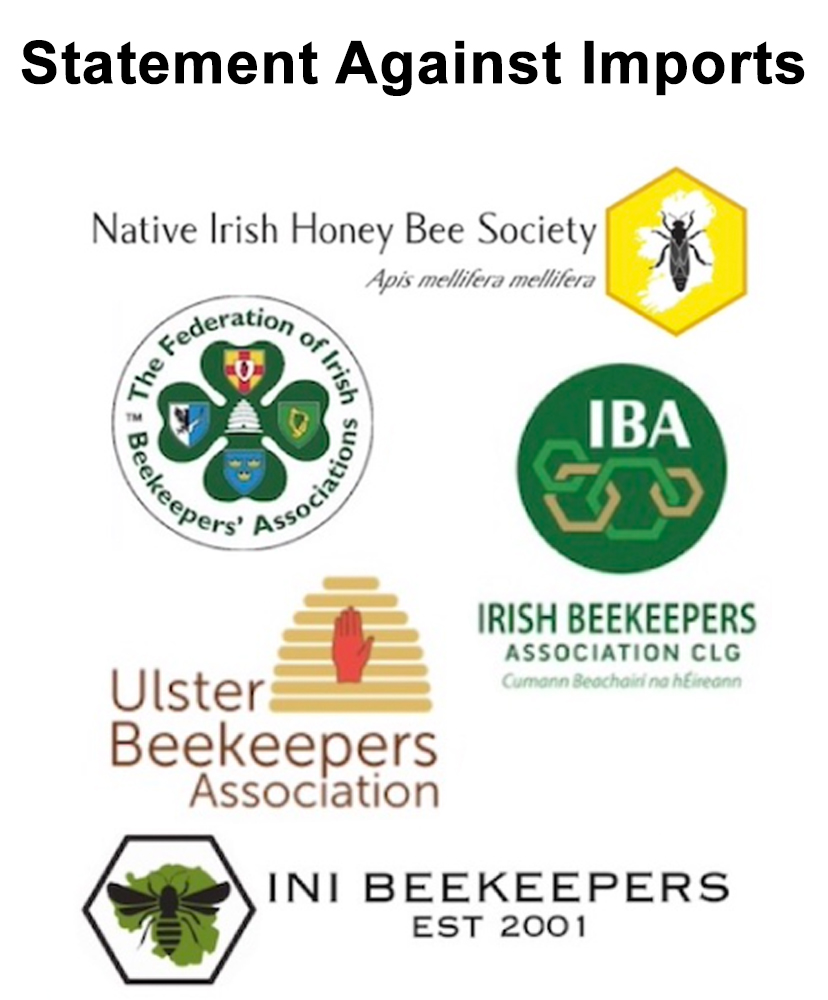The importation of non-native honey bees into Ireland continues. Beekeepers in Ireland want this practice to end immediately, to protect our native bees from the consequences of hybridisation and imported disease, which potentially threaten ALL of Ireland’s bee species1.
Hybridisation
The native Irish honey bee, Apis mellifera mellifera (Amm), also known as the Dark European honey bee, faces extinction by hybridisation throughout most of its original territory of Northern Europe. Ireland is the last bastion where pure strains of Amm still exist throughout. It is widely acknowledged
that Ireland has a unique genetic resource which needs to be protected for the sake of Amm’s survival here as well as its use in European Amm breeding programmes 2
.
Disease
All beekeepers in Ireland suffered the devastation of the imported Varroa mite. Continuing to import bees will introduce other pests and diseases and more virulent strains of pathogens already here:
-
- Small Hive Beetle, found in 2014 in Italy3, from where many bees are imported into Ireland.
-
- The new virulent Type 3 strain of European Foulbrood.
-
- Tropilaelaps mite.
-
- Pests, parasites, pathogens and viruses, currently unknown to science.
These may also pose a threat to our bumble, solitary and wild bee populations, 1/3 of which already face extinction5.
Bees and Beekeeping
Anyone who loves bees, no matter what association or organisation they belong to, can understand the potential dangers. We lived through Varroa’s impact on bee populations, and now those who enjoy beekeeping as a hobby or who make a living from bees risk having their enjoyment and livelihood compromised once again. The serious economic impact of our pollinator populations declining as a direct result of the importation of non-native bees cannot be overstated.
A survey by the National University of Galway (NUIG) confirmed that about 90% of Irish beekeepers work with Amm4.
Amm is the preferred bee for most of Ireland’s large-scale honey producers because it is so well adapted to our environment.
The Problems
The mating of honey bees takes place up in the air often several miles away from their colony and hybridisation occurs when native Amm queens mate with non-native drones. The effects of hybridisation include:
-
- A range of behavioural changes including increased aggression, swarminess, poor over-wintering.
-
- Hybridised bees lack the evolved environmental adaptations of Irish Amm.
-
- Requeening hybridised stocks with replacement queens or uniting to other colonies is costly.
-
- Whole apiaries can be affected.
-
- Amm suppliers, rearing queens and nucs for years, have their small business destroyed overnight.
-
- Hybridised queens and nucs are not saleable.
-
- Honey bee importations will eliminate the native Irish black bee by corrupting the genes beyond retrieval – ‘extinction by hybridisation’.
-
- The accidental importation of more pests and pathogens is a spectre no beekeeper wants to risk.
It’s not too late to act!
Many beekeepers have been working for years to improve, conserve and protect local bees by: bee improvement workshops, breeding programmes, queen-rearing groups, education etc.
Beekeeping associations are creating Conservation Areas (CAs), where members agree to work only with Amm. Unfortunately, these CAs have no weight in law and are ignored by bee importers/traders.
To NIHBS, FIBKA, IBA, UBKA, and INIB, it makes no sense to import non-native bees to this island. It is unfair, unnecessary and potentially exposes our bees and beekeepers to significant risks.
Instead, we are committed to expanding sound bee improvement activities and propagating from existing Amm stocks. We urge everyone to respect our Irish Amm and not import any honey bees into any part of Ireland. We ask all beekeeping groups to encourage their members to purchase native local bees from reputable beekeepers.
Imports must cease immediately to protect our native bees from hybridisation & imported disease.
Loretta Neary, Chairperson The Native Irish Honey Bee Society
John Donoghue, CEO/President, The Federation of Irish Beekeepers’ Associations CLG
Damien Mac Aodha, Chairperson The Irish Beekeepers Association
John Hill, Chairperson The Ulster Beekeepers Association
Michael Young, Chairperson The Institute of Northern Ireland Beekeepers
The Native Irish Honey Bee Society (NIHBS) is an all-Ireland organisation of >1,000 members, whose sole aim is the conservation and preservation of the population of Native Irish Honey Bees, Apis mellifera mellifera.
The Federation of Irish Beekeepers Associations CLG (FIBKA) has approximately 3000 members. Among its aims is ‘To promote the conservation of the native dark bee, Apis mellifera mellifera, along with the provision of education in the beekeeping craft to its members.’
The Irish Beekeepers Association CLG (IBA) has approximately 1200 members from 24 affiliated local beekeeping associations. One of their objectives is to foster the skills of beekeeping in an environmentally sustainable manner.
The Ulster Beekeepers Association (UBKA) is an association of 16 affiliated local beekeeping associations in Ulster with approximately 1200 members.
The Institute of Northern Ireland Beekeepers (INIB) is a charitable organisation and an affiliated area association of the BBKA. It has a deep commitment to educating and informing the public about beekeeping. Each year the INIB runs a programme of events to help inform and educate people about honey bees and the craft of beekeeping.
References
1. https://www.biodiversityireland.ie/wordpress/wp-content/uploads/Summary-note-on-Irelands-bees.pdf
2. https://www.tandfonline.com/doi/full/10.1080/00218839.2018.1433949
3. Aethina tumida in Italy: updates (izsvenezie.com)
4. NUIG bee treatment survey | The Native Irish Honey Bee Society (nihbs.org)
5. https://pollinators.ie/wp-content/uploads/2021/03/FINAL-All-Ireland-Pollinator-Plan-2021-2025-WEB.pdf
Other Useful Links
https://www.oireachtas.ie/en/debates/debate/seanad/2022-06-02/11/
BIBBA Opposes the Importation of Honey Bees and Queens – BIBBA
Small hive beetle in Italy (from DGSAF)
Invasive Species Alert for Asian Hornet | National Parks & Wildlife Service (npws.ie)
This statement can be downloaded HERE


